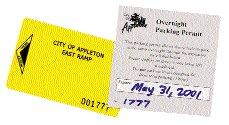
Parking proves difficult for students
Lawrence, like any university, is home to many underground cultures. From country music listeners to underage drinkers, many students have at least one habit that is kept out of the public eye. Another such secret group is the car parkers. There are some 300 of them—of us—who keep a car on or near campus without the knowledge of any administrative authority.The first issue to consider is how many Lawrence students have cars. There are roughly 250 vehicles registered with campus services as of this week, but it must be kept in mind that some of those cars have been taken home or sold. Thus, a conservative estimate is that there are about 200 current student vehicles registered with campus services. Since there are 102 student parking spots, there are about 100 registered vehicles with no place to be parked.
But fewer than half of the cars ticketed on campus are registered with campus services, says Dawn Killian, the administrative assistant for that department. So a conservative estimate of cars without parking spaces that have been ticketed is about 250. Add to that the 26 parking ramp permits that the City of Appleton has issued to Lawrence students and the number of student car owners who never get ticketed. The final estimate then exceeds 300 cars that have no on-campus home.
The only way out of the car-parking underground is via the university’s parking lottery. The parking lottery flier, which is distributed at the start of each term, opens with a statement of the obvious: “Parking is very limited at Lawrence.” The number of available spaces—102—amounts to about one fourth of the demand.
The seniority-based lottery has such poor odds that only about 175 students even bother to participate, says Linda Fuerst of the dean of student’s office.
Through a computer-operated lottery, parking lottery winners obtain the privilege to park in designated lots where they will not be ticketed. There is a fee of $35 to redeem a winning lottery draw, which is “used to defray costs of parking enforcement,” according to the campus services web page.
It is of course unclear what the “costs of parking enforcement” are, since that is simply part of the security officers’ regular duties. The Lawrentian did not endeavor to verify the web page’s claim, but it was found that the money is deposited into an account called “Parking” in the university’s general fund. Those 102 students may find that at least somewhat reassuring; at least the money is going somewhere.
Students who do manage to obtain an on-campus parking permit are still not guaranteed a spot. More students with permits live on the east end of campus than there are nearby available spots. In the other student lots, spaces are taken during the day—against campus policy—by faculty and staff.
As mentioned above, the 102 students with parking permits are the minority. The other 300, one might say, have been thrown out to the street. But not even the lowly street will take them—Appleton prohibits parking from 2 a.m. to 5 a.m. Eric Lom, director of city traffic engineering, says that the intentions of the ordinance were to facilitate street sweeping, snow plowing, and garbage pickup.
So where does this leave the 300 members of Lawrence’s car-parking underground? Many students simply move their cars onto faculty/staff lots after 5 p.m. and back onto the street at 7:30 a.m., when security starts ticketing. Almost every student who owns a car has done this. Those who forget to move their cars in the morning are familiar with the Lawrence warning tickets, while those who forget to move their cars at night are familiar with the city’s $10 tickets.
Ironically, the Lawrence tickets are more threatening, even though they do not cost a penny. The catch is that students with three or more tickets in an academic year may have their cars towed. Tow Star, the towing agency the university uses, will charge about $90 for the towing and one night of storage. Hence the occasional city tickets that one may receive rarely add up to exceed the cost of one tow.
Consequently, many students simply accept the risk of parking illegally overnight. Of course, discussion between two such members of the car-parking underground often drifts toward what streets and parking lots are overlooked by the Appleton police.
For those who want to keep their activities lawful, there is an option. The city allows overnight parking in its East Ramp, which Lawrence students colloquially refer to as “the Younkers Ramp.” For $20 per month (or about $60 per term), students may enter the ramp up to once per day and park for an unlimited time.
With all of the hassles of parking, especially for the underground car owners, one might ask why it is even necessary to have a car at Lawrence.
The answer has two parts. The first is geographical—the nearest supermarket is 1.7 miles away from campus and the nearest discount department store is 2.7 miles away. Such distances are not easily walked, especially with bagfuls of groceries and supplies. Moreover, the cities of the Fox Valley are simply not designed for pedestrians. Grand Chute, Appleton’s retail-oriented neighbor and home of Woodman’s Supermarket and the Fox River Mall, does not even have sidewalks.
The second part of the answer lies at a deeper level. 90 percent of Lawrence students are Americans, and as such, many feel the call of the open road. The car is a symbol of freedom; it is a physical way to escape the academic rigors and social constraints that college living imposes on them.
For now, there is no easy way for Lawrence students to reconcile their transportation needs and the quantity of available parking spaces. The underground culture of car owners at Lawrence will therefore continue. Linda Fuerst, who coordinates the parking lottery, sums it up best: “There’s no end in sight.”
